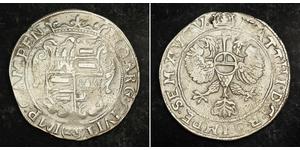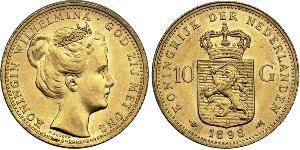28 Stuiver (sold for $85.0)
1619, Netherlands, Kampen. Silver 28 Stuivers (Florin) Coin. Error in Legend!
Denomination: 28 Stuivers (Florin) Mint Place: Kampen (Netherlands) Mint Period: 1612-1619 (struck without date!) Reference: KM-23. var. (here with an error in reverse legend!) Condition: A scratch in obverse, crudely struck as usual, otherwise a nice VF+ Weight: 18.48gm Diameter: 41mm Material: Silver
Obverse: Crowned and foliaged shield with arms of Kampen. Value (28) in oval frame splitting legend below. Legend: MO . ARG : CIVIT (28) IMP : CAMPEN
Reverse: Crown above double-headed eagle with cross topped orb at chest. Legend with titles of Emperor Matthias I around. Legend: MATTHI . D . G . RO . IMPE . SEM . VAVGV (the engraver obviously punched a V at teh beginning of the legend, then noticed his mistake and punched the A over it in order to complete the legend, which says AVGV for AVGVSTVS, the last part of the titles of the emperor Matthias!)
Kampen is a city and municipality in the province of Overijssel, Netherlands. A member of the former Hanseatic League, it is located at the lower reaches of the river IJssel. The municipality of Kampen had a population of 53,063 in 2017 and covers an area of 161.79 square kilometres (62.47 square miles). Kampen is located in the North West of Overijssel and is the largest city in this region. The city of Kampen itself has around 35,000 inhabitants. Kampen has one of the best preserved old town centres of the Netherlands, including remains of the ancient city wall (of which three gates are still standing) and numerous churches. Also notable are the three bridges over the IJssel which connect Kampen with IJsselmuiden and Kampereiland, the agricultural area between the branches which form the IJssel delta, and a windmill (d' Olde Zwarver – the Old Vagabond). Traditionally people in Kampen speak a variation of the Sallands dialect, known as Kampers.
Matthias of Austria (24 February 1557 – 20 March 1619) was Holy Roman Emperor from 1612, King of Hungary and Croatia from 1608 (as Matthias II) and King of Bohemia from 1611. He was a member of the House of Habsburg.
Matthias was born in the Austrian capital of Vienna to Maximilian II, Holy Roman Emperor and Maria of Spain.
Matthias married Archduchess Anna of Austria, daughter of his uncle Archduke Ferdinand II of Austria, whose successor in Further Austria Matthias became in 1595. Their marriage did not produce surviving children.
In 1578, Matthias was invited to the Netherlands by the States-General of the rebellious provinces, who offered him the position of Governor-General. Matthias accepted the appointment, although the position was not recognized by his uncle, Philip II of Spain, the hereditary ruler of the provinces. Matthias nonetheless remained as titular governor for the rebels until they deposed Philip II and declared full independence in 1581, at which point Matthias returned home to Austria.
In 1593 he was appointed governor of Austria by his brother, Emperor Rudolf II. He formed a close association there with the Bishop of Vienna, Melchior Klesl, who later became his chief adviser. In 1605 Matthias forced the ailing emperor to allow him to deal with the Hungarian Protestant rebels. The result was the Peace of Vienna of 1606, which guaranteed religious freedom in Hungary and guaranteed the right of Transylvanians to elect their own independent princes in the future. In the same year Matthias was recognized as head of the House of Habsburg and as the future Holy Roman Emperor, as a result of Rudolf's illness. Allying himself with the estates of Hungary, Austria, and Moravia, Matthias forced his brother to yield rule of these lands to him in 1608; Rudolf later ceded Bohemia in 1611. Matthias's army then held Rudolf prisoner in his castle in Prague, until 1611, when Rudolf was forced to cede the crown of Bohemia to his brother.
After Matthias's accession as Holy Roman Emperor, his policy was dominated by Klesl, who hoped to bring about a compromise between Catholic and Protestant states within the Holy Roman Empire in order to strengthen it. Matthias had already been forced to grant religious concessions to Protestants in Austria and Moravia, as well as in Hungary, when he had allied with them against Rudolf. Matthias imprisoned Georg Keglevic who was the Commander-in-chief, General, Vice-Ban of Croatia, Slavonia and Dalmatia and since 1602 Baron in Transylvania, but soon left him free again. At that time was the Principality of Transylvania a fully autonomous, but only semi-independent state under the nominal suzerainty of the Ottoman Empire, where it was the time of the Sultanate of Women.
Matthias's conciliatory policies were opposed by the more intransigent Catholic Habsburgs, particularly Matthias's brother Archduke Maximilian, who hoped to secure the succession for the inflexible Catholic Archduke Ferdinand (later Emperor Ferdinand II). The start of the Bohemian Protestant revolt in 1618 provoked Maximilian to imprison Klesl and revise his policies. Matthias, old and ailing, was unable to prevent a takeover by Maximilian's faction. Ferdinand, who had already been crowned King of Bohemia (1617) and of Hungary (1618), succeeded Matthias as Holy Roman Emperor.
Matthias died in Vienna in 1619.
Only 1$ shipping on each additional (combined) item purchased!

|
Posted by:
anonymous 2018-02-12 |
|
||
|
||
|
||
|
||
|
||
432 coins were grouped from 2024-04-17 to 2024-04-24
One of them is:
1 Fiorino Italy / Italian city-states Silver
group has 3 coins / 1 prices
⇑




 English
English













